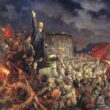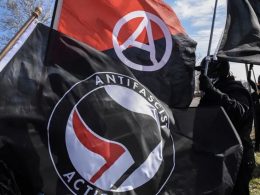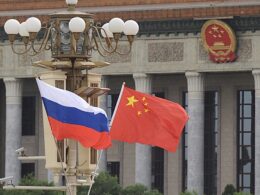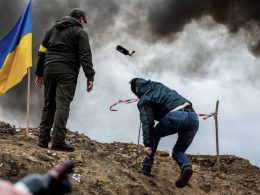NATO is incrementally finding itself getting kicked out of Eurasia. The imperialist color revolution attempt in Hong Kong has failed. The imperialists remain terrified that they won’t be able to stop their bourgeois regime in Taiwan from getting assimilated by the Communist Party of China. This year’s terroristic Western attempt at regime change in Kazakhstan has failed. Washington hasn’t been able to spark a terrorist proxy war in Afghanistan through its Uyghur extremists and new Mujahideen. Iran and Syria hold out against imperialist regime change attempts. Yemen’s Houthis have effectively defeated the Saudi coalition. China, the central target of Washington’s schemes, continues to grow more powerful and internally stable. Russia, the crucial Chinese strategic ally that Washington seeks to break apart so China can be subdued, isn’t ultimately being weakened by the U.S. proxy war in Ukraine or by the sanctions. Russia is hurting of course, but it will come out stronger. The same can’t be said for the U.S. and its European satellite regimes.
The situation is still in flux, both in Eurasia and in the other regions Washington is trying to destabilize to stave off the emergence of a multipolar world. The U.S. has been succeeding in a number of coups, and in keeping subdued places like Libya too chaotic to restore their former anti-imperialist states. Within Eurasia, the Black Sea region is a place where the imperialists have been making a lot more progress than in the other places. As World Socialist Website’s Cari Weiss has written about Washington’s desires for fomenting instability in this part of the world:
In his book The Grand Chessboard, Zbigniew Brzezinski, one of the most influential foreign policy advisers of Washington in the past half century, elaborated on the principal significance of what geostrategists call “Eurasia”—the landmass of Europe and Asia—for the desperate efforts by the US to preserve its global hegemony. Within Eurasia, Brzezinski identified what he called the “Eurasian Balkans” as the region where the major conflicts over the control of all of Eurasia would take place. This region, Brzezinski wrote, stretched “from Crimea in the Black Sea directly eastward along the new southern frontiers of Russia, all the way to the Chinese province of Xinjiang, then down to the Indian Ocean and thence westward to the Red Sea, then northward to the eastern Mediterranean Sea and back to Crimea.” Almost all of the 25 states in this region, he continued, are “ethnically as well as religiously heterogeneous and practically none of them [are] politically stable. … This huge region, torn by volatile hatreds and surrounded by competing powerful neighbors, is likely to be a major battlefield, both for wars among nation-states and, more likely, for protracted ethnic and religious violence.”
These successes of imperialism in the region are negligible though. The April coup in Pakistan that Washington funded may have been carried through, but Pakistan hasn’t fulfilled Washington’s desires of the country cutting ties with China, Iran, and Russia. Modern Diplomacy has reported that “Islamabad has so far walked a tightrope even after the change of government. As a matter of fact, West wanted Pakistan to isolate from China and cut off close ties. The irony is that, it is the West, who kept distance from Pakistan since 2004, and almost has written-off completely, and also do not want to see China as a close and strategic friend of Pakistan.” Pakistan is having talks with Iran about bilateral relations. And there’s evidence that Pakistan’s new regime seeks to strengthen its ties to Russia, though the grave economic threat which any U.S. sanctions pose to Pakistan means that the regime seeks to do so while sufficiently appeasing Washington.
Ukraine, the other country in the region where Washington has successfully carried out a coup during the new cold war, has of course filled its intended role as a weapon against Russia, and against China by extension. But the damage dealt by the Ukraine proxy war, and by its surrounding sanctions, have accelerated the U.S. empire’s decline. Bloomberg reports that “some Biden administration officials are now privately expressing concern that rather than dissuading the Kremlin as intended, the penalties are instead exacerbating inflation, worsening food insecurity and punishing ordinary Russians more than Putin or his allies.” As much as the cold warriors try to rationalize the ways the sanctions hurt U.S. livings standards by portraying this as the “cost of freedom,” the material reality is that this has further endangered the internal social stability imperialism depends on. The masses in the core are being brought closer to revolt, and more of them are becoming ready to take on a revolutionary consciousness.
Stalin wrote about the mutually destructive competition among the capitalist warmongers, assessing, “This frenzied struggle among the various groups of capitalists is notable in that it includes as an inevitable element imperialist wars, wars for the annexation of foreign territory. This circumstance, in its turn, is notable in that it leads to the mutual weakening of the imperialists, to the weakening of the position of capitalism in general, to the acceleration of the advent of the proletarian revolution and to the practical necessity of this revolution.” Even as the NATO powers have become more unified by the Ukraine conflict, their determination to crush Russia has brought their people’s conditions towards this point of practical necessity for upheaval.
What’s ironic is that neither Russia nor China have the strength of capital to act as imperialist powers. They’re both far closer to being semi-peripheral countries. They don’t pose the kind of threat to the U.S. bloc’s capital that Stalin described. The U.S. bloc poses that kind of threat to itself, even when it’s working in fortified unison. The true threat the Chinese bloc poses is one of no longer allowing imperialism to continue expanding into new markets, which is the essential requirement for capitalism’s survival. Simply by existing in a form that’s not beholden to Washington, and by coexisting amongst each other, the anti-imperialist bloc countries are weakening U.S. capital. And as Stalin concluded, where capital is weakest is where proletarian revolution is most likely to be carried through.
This is why Washington has been so desperate to sow disunity among the geopolitically independent powers, considering plans such as making Vietnam into a bulwark against China and hoping for the Ukraine conflict to strain the Russia-China relationship. These three countries remain increasingly close, driven to work together by U.S. provocations—including underhanded color revolution tactics against Washington’s supposed ally Vietnam. The imperialists are making their own schemes unravel, multiplying their problems through the maneuvers they’re trying to use to restore hegemony.
Global dominance depends on being perceived as credible by the world, and Washington is only destroying this goodwill from the peoples it seeks to command respect over. Its sanctions against Xinjiang, predicated on transparent lies about a “Uyghur genocide,” have economically hurt the Uyghurs, uniting the Uyghurs and the rest of the Chinese masses in outrage against Washington. Its installation of a belligerent fascist regime in Kiev that’s been ethnically cleansing Russian speakers has united most Russians in support for humanitarian intervention in the Donbass. Such alienation towards Washington has been the mass reaction in all the other places harmed by U.S. sanctions.
By putting a quarter of the world’s population under sanctions, with the amount constantly growing, the imperialists have effectively conceded defeat. They won’t be able to destroy the countries which defy them by doing this. In fact, the sanctions are prompting these countries to strengthen their alliances and further decouple from U.S. capital, as Russia is doing by becoming more economically self-sufficient amid the economic siege. The imperialists are waging this vast economic war out of spite, impotent in their hopes to actually subdue their adversaries, while consequently making those in the core more likely to turn against the ruling class.—————————————————————————
If you appreciate my work, I hope you become a one-time or regular donor to my Patreon account. Like most of us, I’m feeling the economic pinch during late-stage capitalism, and I need money to keep fighting for a new system that works for all of us. Go to my Patreon here.








